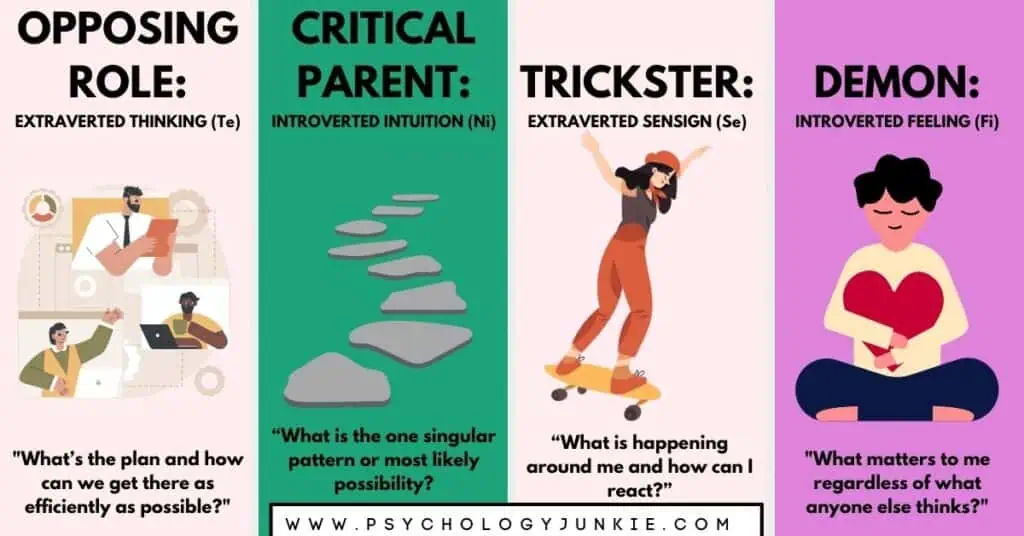Have you ever ever questioned why you typically react in ways in which don’t really feel such as you? Or why sure conditions deliver out an surprising defensiveness, irritation, or perhaps a sense of being misplaced in your personal thoughts? Whereas your major cognitive features form the best way you naturally course of info and make choices, there’s a complete shadow aspect of your psyche working behind the scenes. These are your shadow features—the psychological processes that function exterior of your aware consciousness however nonetheless affect your perceptions, reactions, and private progress.
Understanding these features is like shining a lightweight into the unconscious corners of your thoughts. They don’t seem to be inherently good or unhealthy, however they typically present up in instances of stress, battle, or actually deep, nearly scary introspection. By studying about them, you’ll be able to start to acknowledge patterns in your conduct, keep away from pointless projections onto others, and even use these features as instruments for private growth quite than blind spots that journey you up.

However apologies prematurely, studying concerning the shadow features can really feel a bit like being slapped within the face! I do know after I researched mine as an INTJ I really feel a bit annoyed and overwhelmed. However both approach the knowledge remains to be extraordinarily helpful in understanding your self, getting balanced, and bettering your relationships with individuals of different varieties!
This text comprises an affiliate hyperlink to a questionnaire on Persona Hacker. If you buy one among their programs, I get a small kickback that I can use to pay for internet hosting and different calls for of this website. I solely suggest programs I like.
Estimated studying time: 25 minutes
What’s the 8-Operate Mannequin?
The 8-function mannequin—a framework developed by Jungian analyst John Beebe—provides perception into not simply the strengths of every persona sort, but in addition the hidden points that lie within the shadow of consciousness.
Most individuals, when studying about Myers-Briggs®, deal with the four-letter sort code (INTP) and cease there. Some go additional and uncover the 4 major cognitive features—the psychological instruments that an INTP actively makes use of:
Dominant (Hero): Introverted Considering (Ti)
Auxiliary (Guardian): Extraverted Instinct (Ne)
Tertiary (Little one): Introverted Sensing (Si)
Inferior (Anima/Animus): Extraverted Feeling (Fe)
These features form how INTPs analyze info, discover concepts, recall particulars, and have interaction (typically reluctantly) with the emotional world. Nonetheless, that is solely half the story.
Beneath these aware features are 4 extra—the shadow features. These are the cognitive processes that sit exterior of an INTP’s instant consciousness, typically surfacing in moments of stress, insecurity, or battle. They’re:
Opposing Position: Extraverted Considering (Te)
Important Guardian: Introverted Instinct (Ni)
Trickster: Extraverted Sensing (Se)
Demon: Introverted Feeling (Fi)
In contrast to the first features, which an INTP makes use of with relative ease, the shadow features typically really feel overseas, irritating, and even antagonistic. After they emerge, they will distort notion, create inner battle, or result in misunderstandings with others. Nonetheless, in addition they serve a objective: to problem, steadiness, and typically even shield the dominant ego from overextension.
John Beebe, the psychologist who developed the 8-function mannequin, described these features as unconscious points of the persona that are likely to “struggle soiled” after they floor. Based on Beebe, “The shadow is the a part of us that others see, however we don’t.” In different phrases, these features can affect conduct in methods which are apparent to these round us however stay hidden from our personal self-awareness.
Why Shadow Capabilities Matter
At first look, the shadow features would possibly look like obstacles—quirks of the psyche that solely trigger bother when triggered. However they’re excess of that.
Our major features give us confidence and a way of stability in the best way we predict, talk, and have interaction with the world. Nonetheless, when life throws us challenges that our dominant features aren’t geared up to deal with, the shadow features step in, typically in unpredictable methods.
For INTPs, this may manifest as:
A sudden impatience with inefficiency (Te)
A harsh internal voice critiquing their path in life (Ni)
A battle with impulsivity or feeling out-of-sync with bodily actuality (Se)
A deep however unsettling confrontation with their private values and feelings (Fi)
When these features seem, they will really feel disruptive and even alarming. However in addition they supply a path to progress. Mark Hunziker, creator of Depth Typology, explains that shadow features can act as a “catalyst for individuation,” pushing us to develop points of ourselves that we would in any other case ignore.
Somewhat than seeing them as weaknesses or indicators of failure, INTPs can study to acknowledge their shadow features as warning alerts, unconscious guides, and even hidden strengths ready to be built-in. By doing so, they acquire a extra full and nuanced understanding of themselves and develop a higher sense of steadiness of their cognitive processes.
A Temporary Have a look at the INTP’s 4 Main Cognitive Capabilities
Earlier than we discover the shadow features, it’s essential to grasp the 4 major features that form the INTP’s aware thoughts. These are the psychological instruments that INTPs use instinctively, forming the inspiration of how they course of info and make choices.
1. Dominant Operate: Introverted Considering (Ti) – The Analytical Core
On the coronary heart of the INTP’s persona is Introverted Considering (Ti)—a psychological course of devoted to precision, logical consistency, and conceptual readability. Ti is continually deconstructing and refining info, trying to find underlying rules that make sense.
INTPs use Ti to investigate and systematize their understanding of the world.
They like to work by issues independently, counting on their inner reasoning quite than exterior authority or group consensus.
Ti naturally questions every part, typically breaking down even the only concepts to their rawest elements.
When Ti is at its finest, it permits INTPs to generate profound insights and develop extremely refined fashions of how issues work. Nonetheless, over-reliance on Ti can result in extreme evaluation paralysis, making it tough for INTPs to take decisive motion.
Whereas Ti breaks issues down into their most important truths, Extraverted Instinct (Ne) pushes outward, looking for patterns, prospects, and various views. Ne is what makes INTPs endlessly curious, open-minded, and idea-driven.
Ne sparks the INTP’s tendency to go down mental rabbit holes, connecting seemingly unrelated ideas in fascinating methods.
It provides INTPs a broad, future-oriented perspective, permitting them to see what might be quite than simply what’s.
It loves brainstorming, theoretical discussions, and summary problem-solving.
Ne makes INTPs mentally agile and modern, however it might additionally pull them in too many instructions without delay, resulting in restlessness and a scarcity of follow-through.
3. Tertiary Operate: Introverted Sensing (Si) – The Archivist of Expertise
Introverted Sensing (Si) operates within the background, serving to INTPs monitor particulars, recall previous experiences, and preserve a way of stability. In contrast to dominant Si customers (like ISTJs or ISFJs), INTPs don’t depend on Si as a major operate, nevertheless it nonetheless performs an essential position.
Si helps INTPs retailer and retrieve info in an organized approach, contributing to their huge psychological libraries of information.
It alerts INTPs to inner bodily wants (starvation, exhaustion, well being considerations), although they typically ignore these alerts in favor of mental pursuits.
It supplies a way of continuity and inner construction, reminding the INTP of private classes discovered from the previous.
As a result of Si is a tertiary operate, INTPs could battle with routine, construction, or consistency, although they typically admire this stuff when they’re imposed externally.
On the backside of the INTP’s major operate stack is Extraverted Feeling (Fe)—a course of that’s all about group concord, emotional expression, and interpersonal connection. Whereas Fe is almost unconscious for INTPs, it’s nonetheless one thing they worth and aspire to make use of nicely.
INTPs could really feel awkward in social conditions, not sure of find out how to categorical heat or emotional help.
Fe helps them decide up on social dynamics, although they could battle to navigate them easily.
When Fe emerges, it might manifest as sudden bursts of emotional depth, typically stunning even the INTP themselves.
Fe is an INTP’s Achilles’ Heel, however creating it might assist them enhance relationships, categorical appreciation extra simply, and steadiness their pure detachment with heat.
An Introduction to the INTP’s Shadow Capabilities


Now that we perceive what shadow features are and why they matter, let’s take a better have a look at how they manifest within the INTP persona sort.
Every of those shadow features performs a unique position, typically undermining the INTP’s pure tendencies, different instances rising as a defensive mechanism. Whereas they don’t seem to be the core drivers of an INTP’s psyche, they nonetheless exert affect in delicate (and typically not-so-subtle) methods.
As an INTP, your dominant operate—Introverted Considering (Ti)—is an inwardly centered, exact course of that wishes to grasp how every part works with a view to grasp a way of accuracy or reality. It operates on principle-based reasoning, breaking concepts right down to their core elements earlier than reaching a conclusion. Ti works finest within the realm of theoretical refinement quite than sensible execution.
Nonetheless, standing in stark distinction to that is Extraverted Considering (Te)—the INTP’s Opposing Position operate. Te is the operate of effectivity, construction, exterior group, and fast decision-making primarily based on measurable outcomes. In contrast to Ti, which rigorously constructs an inner framework of reality, Te is concentrated on imposing order on the skin world, imposing guidelines, and executing choices rapidly.
Since Te is within the Opposing Position, INTPs typically resist or really feel uneasy about its affect, whether or not in themselves or in others. It might emerge as a defensive, argumentative voice when the INTP feels pressured or when their Ti-driven method is challenged.
How Te Exhibits Up within the INTP Psyche
John Beebe, the psychologist behind the 8-function mannequin, describes the Opposing Position operate as a course of that emerges after we really feel our dominant operate is being obstructed or contradicted. In different phrases, when an INTP feels that their Ti-driven pursuit of logic is being ignored, rushed, or dismissed, Te could floor as a resistant, argumentative drive.
1. Resistance to Exterior Effectivity Calls for
INTPs love precision, depth, and nuance, however they don’t seem to be all the time fast to behave. Te, in distinction, calls for quick, actionable, and measurable outcomes. Due to this, INTPs could push again in opposition to Te-based constructions, guidelines, and efficiency-driven expectations—particularly after they really feel these expectations don’t enable for adequate evaluation or mental freedom.
Instance:
Think about an INTP software program developer who’s rigorously refining their code, ensuring that each line is optimized and logically sound. Immediately, a Te-heavy supervisor (seemingly an ESTJ or ENTJ) steps in and says:
“Simply get it working. It doesn’t have to be excellent—ship it and repair the bugs later.”
To the supervisor, effectivity and assembly deadlines matter greater than absolute logical perfection. To the INTP, nonetheless, this seems like mental laziness, and Te (Opposing Position) kicks in defensively:
“That’s an absurd solution to do issues! If we don’t get it proper now, we’ll have a large number later! Chopping corners goes to create extra issues!”
Right here, the INTP isn’t totally embracing Te’s approach of working, however quite utilizing it defensively to push again in opposition to exterior construction, rigidity, and “work for work’s sake”.
“The Opposing Position operate typically exhibits up as an argumentative or obstructive drive after we really feel our dominant operate is being ignored.”— John Beebe
2. The Push-Pull Between Concept (Ti) and Utility (Te)
One other approach Te manifests as an Opposing Position is within the INTP’s inner battle between concept and execution. Whereas INTPs love refining concepts and ideas, they could resist transferring into motion in the event that they really feel their theories are usually not but “excellent.”
Te, nonetheless, calls for software, testing, and tangible outcomes. When an INTP feels pressured to show an thought into one thing sensible earlier than they really feel prepared, they could react with frustration, procrastination, or outright refusal.
Instance:
An INTP spends months creating a fancy, elegant enterprise mannequin for an modern new tech product. They’ve totally analyzed each doable flaw, draw back, and various. A business-savvy good friend (an ENTJ) says:
“You’ve been engaged on this concept without end. When are you truly going to start out the enterprise?”
The INTP, feeling their Ti-based refinement course of is being rushed, could resist the push to take motion:
“It’s not prepared but. I must suppose by a number of extra doable variables earlier than I can transfer ahead.”
Te’s voice would possibly chime in internally: “You must simply decide already. What’s the purpose of all this evaluation for those who by no means use it?” However as a result of Te is within the Opposing Position, it typically comes throughout as an irritating stress quite than a instrument they naturally wield.
3. Defensiveness Towards Te-Dominant People
Since INTPs are naturally skeptical of inflexible constructions and enforced guidelines, they could resist or push again in opposition to Te-dominant individuals (TJ varieties) who’re all about practicality, ahead momentum, and checking off the field, dang it!
In conversations, an INTP would possibly react negatively when a Te-user focuses on information, statistics, or blunt decision-making with out contemplating theoretical depth or minor nuances.
Instance:
An ENTJ and an INTP are debating local weather coverage. The ENTJ pulls up charts, figures, and statistics, rapidly asserting a powerful, decisive conclusion primarily based on the out there knowledge:
“The numbers converse for themselves. We have to implement X coverage now. There’s no level losing time theorizing when the information are proper right here.”
The INTP, sensing a scarcity of deeper theoretical consideration, pushes again:
“That’s an oversimplification. Have you ever thought-about the long-term financial ripple results? What about various fashions that haven’t been examined but?”
The Te-dominant individual sees the INTP as unnecessarily overcomplicating issues, whereas the INTP sees the Te-user as speeding towards a conclusion with out correctly evaluating all of the variables. That is the traditional Ti vs. Te conflict.
How INTPs Can Combine Te for Progress
Whereas INTPs could expertise Te as an oppositional, irritating drive, acknowledging its worth can result in actual progress. Te isn’t inherently unhealthy—the truth is, creating a more healthy relationship with Te may also help INTPs apply their concepts in an actual, tangible approach.
Listed here are some methods INTPs can steadiness Ti and Te for a simpler way of living and work:
1. Recognizing When “Excellent” Is the Enemy of “Executed”
Not each thought must be totally optimized earlier than taking motion. Typically, progress is healthier than perfection.
Tip: Set deadlines for decision-making to keep away from countless refinement.
2. Studying to Recognize Construction
Whereas Te-heavy environments (company settings, inflexible schedules) can really feel restrictive, some construction may also help INTPs execute their concepts extra successfully.
Tip: Experiment with small routines or productiveness methods to steadiness flexibility with tangible progress.
3. Viewing Effectivity as a Instrument, Not an Impediment
Te isn’t the enemy—it’s a solution to deliver concepts to life. When used correctly, it might assist INTPs flip their mental discoveries into one thing actionable.
Tip: Observe small functions of concepts quite than ready till every part is completely refined.
The Important Guardian: Introverted Instinct (Ni) – The Harsh Interior Critic
Within the INTP’s cognitive operate stack, Introverted Instinct (Ni) sits within the Important Guardian (or Senex) place, which means that it typically exhibits up as an internalized, harsh, and judgmental voice. In contrast to the INTP’s auxiliary operate, Extraverted Instinct (Ne), which is all the time increasing concepts and exploring a number of prospects, Ni is concentrated, singular, and predictive, narrowing its focus onto one possible consequence or singular reality.
The Important Guardian operate is an unconscious course of that always seems as self-criticism or condescension towards others or ourselves, particularly in moments of stress, uncertainty, or battle. As a result of Ni just isn’t an INTP’s pure power, it tends to floor as a stern, dismissive, and typically paralyzing drive, questioning the INTP’s path, imaginative and prescient, or means to make sense of the long run.
How Ni Exhibits Up within the INTP Psyche
John Beebe describes the Important Guardian operate as a voice that “belittles, inactivates, and humiliates.” It’s judgmental and harsh, typically manifesting as a voice of doubt that challenges the person’s pure strengths.
For INTPs, this typically takes the type of an internal critic that undermines their Extraverted Instinct (Ne)—the operate that helps them discover concepts freely and generate new prospects. The place Ne loves open-ended exploration and a number of prospects, Ni calls for a singular, absolute reply—and it’s typically important of the INTP for not having one.
Listed here are the most typical methods Ni seems within the INTP’s thoughts:
1. Self-Criticism About Course and Objective
Whereas INTPs love exploring concepts and increasing their data, they could battle with committing to a single path or long-term imaginative and prescient. Due to this, Ni (Important Guardian) can manifest as an internal voice that questions whether or not they’re losing time or aimlessly drifting by life.
Instance:
An INTP would possibly spend months researching completely different profession paths, feeling excited concerning the prospects (Ne). However then, Ni kicks in with a important voice:
“You’re simply losing time hopping between concepts. What are you truly doing along with your life?”
“You retain amassing data, however does any of it truly lead someplace?”
“At this price, you’ll by no means have a transparent path.”
This may result in existential frustration, making the INTP really feel like their curiosity and adaptability are weaknesses quite than strengths.
The Important Guardian operate manifests as an internal voice that belittles our pure strengths, making us doubt ourselves after we ought to be embracing our course of.
2. Skepticism Towards Folks Who Are “Too Sure”
Since Ni goals for singular readability, INTPs could also be dismissive or important of people who current a single, definitive “reality” with out contemplating various viewpoints.
As a result of INTPs naturally query every part and like to investigate a number of prospects, they could see Ni-dominant individuals (like INTJs or INFJs) as narrow-minded or overconfident of their predictions.
Instance:
An INTJ confidently asserts in a dialog:
“AI will utterly exchange inventive jobs inside the subsequent decade. The patterns are apparent.”
The INTP, sensing the singularity of the assertion, could react with Ni (Important Guardian) and push again:
“That’s a ridiculous assumption. The world is approach too complicated to foretell one thing like that so completely.”
Despite the fact that the INTJ’s assertion is predicated on their very own Ni-informed insights, the INTP could really feel that anybody who claims to “know” the long run is oversimplifying actuality—even when the prediction has benefit.
Introverted Instinct (Ni) seeks a singular prediction, whereas Extraverted Instinct (Ne) generates an increasing number of prospects. When Ni seems within the INTP’s Important Guardian place, it typically results in frustration with certainty—whether or not in themselves or others.
3. Paralysis Over Making the “Proper” Selection
Since Ni prefers singularity, INTPs could really feel overwhelmed by main life choices. Their pure inclination (Ne) is to maintain all prospects open, however their Important Guardian Ni could insist that they should discover the “one proper path”—inflicting self-doubt and procrastination.
Instance:
An INTP is contemplating two completely different job provides:
A steady however much less thrilling job in academia.
A riskier however doubtlessly fulfilling alternative in inventive writing.
At first, Ne is worked up concerning the prospects of each—however then Ni (Important Guardian) emerges:
“What for those who’re making an enormous mistake? What for those who select the incorrect one and remorse it for the remainder of your life?”
“It is best to already know precisely what you need by now. Why don’t you?”
This sort of paralysis could make INTPs hesitate indefinitely, fearing that any alternative they make will shut off future prospects.
How INTPs Can Combine Ni for Progress
Though Ni (Important Guardian) can really feel like a harsh voice, it additionally provides beneficial insights when built-in consciously. As a substitute of fearing or resenting Ni’s affect, INTPs can study to make use of it as a instrument for deeper self-awareness and long-term imaginative and prescient.
1. Settle for That No One Has a Completely Clear Path
As a substitute of feeling ashamed for missing a transparent long-term path, acknowledge that most individuals don’t have one.
Ni just isn’t about having every part found out immediately—it’s about creating belief in instinct over time.
2. Use Ni for Strategic Considering
Whereas Ne is nice for exploring, Ni may also help INTPs slim issues down when crucial.
Tip: When overwhelmed with choices, ask: “Which of those feels essentially the most deeply proper to me?”
3. Acknowledge That Some Certainty Is Essential
Whereas INTPs are naturally skeptical of definitive statements, there are occasions when dedication to a single path is required.
Tip: Set a time restrict for decision-making so that you just don’t get trapped in over-analysis.
And now it’s time to maneuver on to the mischievous Trickster place. The Trickster is an archetype of dysfunction, mischief, and unpredictability, typically manifesting in moments of excessive stress, battle, or confusion. In contrast to the INTP’s tertiary operate, Introverted Sensing (Si), which supplies them a steady inner reference level primarily based on previous experiences, Se is hyper-focused on the instant current, real-time consciousness, and bodily interplay with the exterior world.
Since Se just isn’t a aware or well-developed operate for INTPs, when it emerges, it tends to disrupt their common mind-set, inflicting sensory overload, impulsive choices, or distorted perceptions of actuality. The Trickster operate additionally tends to entice others in double binds, which means that when INTPs unconsciously use Se, they may unintentionally create complicated or contradictory conditions—typically to flee stress or regain management in an interplay.
How Se Exhibits Up within the INTP Psyche
Mark Hunziker, in Depth Typology, describes the Trickster operate as a drive that undermines guidelines and constructions, typically playfully, typically chaotically. It’s not an evil operate, however one that may make issues really feel irrational, inconsistent, and disorienting.
For the INTP, Se just isn’t a aware instrument—it tends to floor when they’re caught off guard, backed right into a nook, or below excessive stress. As a substitute of offering clear sensory consciousness like it might for an ESTP or ESFP, Se can really feel like sensory chaos, resulting in clumsy actions, distorted perceptions, or surprising risk-taking behaviors.
Right here’s the way it usually manifests:
1. Sensory Clumsiness and Lack of Bodily Consciousness
INTPs typically battle to react to their bodily atmosphere. As a result of Se is within the Trickster place, they could be oblivious to real-world particulars, typically leading to misjudged distance, neglect of bodily wants, or a battle with hands-on duties.
Instance:
An INTP is so deep in considered theoretical physics that they don’t discover their espresso cup sitting precariously near the sting of the desk. After they attain for a e book, they knock the cup over, spilling espresso in all places.
At that second, Se would possibly floor in frustration:
“How did I not see that?”
“Why am I so unhealthy at dealing with easy bodily issues?”
As a result of Se is unconscious, the INTP would possibly blame exterior elements quite than recognizing their very own lack of sensory consideration.
When Se is within the Trickster place, actuality can really feel unpredictable, and the INTP could battle with spontaneous, real-world changes.
2. Impulsive Selections Beneath Stress
More often than not, INTPs need to analyze conditions earlier than performing. Nonetheless, in moments of utmost stress or emotional overload, Trickster Se can take over, main them to behave rashly, make impulsive choices, or be reckless in a approach that might usually make them cringe.
Instance:
An INTP, exhausted from overthinking a serious life determination, all of a sudden books a last-minute, costly trip with no prior planning. As a substitute of rigorously contemplating the monetary or logistical penalties, they throw warning to the wind and act purely on impulse—a conduct utterly out of character for them.
Later, they could look again and suppose:
“What was I pondering? That was utterly irrational.”
“That didn’t really feel like me in any respect.”
As a result of Se isn’t below aware management, these impulses are sometimes random, excessive, and poorly thought out, resulting in remorse or confusion as soon as the INTP returns to their common logical state.
3. Distorted Perceptions of Sensory Actuality
Since INTPs don’t naturally interact with Se, their notion of real-world occasions can typically be inaccurate or skewed. They might misread social cues, misunderstand bodily risks, or battle to acknowledge modifications of their environment.
Instance:
An INTP at a celebration fails to note that their sarcastic joke has made somebody uncomfortable. When later confronted about it, they’re genuinely stunned:
“Wait, I didn’t even notice they have been upset.”
“Are you certain they have been truly offended, or are you overreacting?”
As a result of Trickster Se doesn’t give them clear, real-time social consciousness, INTPs could dismiss or doubt the validity of bodily or emotional cues that appear apparent to others.
They might additionally fail to acknowledge hazard of their atmosphere, assuming they’re extra conscious than they really are. For instance:
Strolling into site visitors whereas absorbed in deep thought.
Misjudging how briskly a automotive is transferring when crossing the road.
Failing to note that they left the range on.
These lapses aren’t about intelligence—they’re merely a results of Se being an unconscious, unreliable operate for INTPs.
4. Projection and Distrust of Se-Dominant Sorts
As a result of INTPs don’t belief Se, they could venture unfavourable traits onto Se-dominant varieties (like ESTPs and ESFPs), seeing them as:
Reckless or shallow (“They only act with out pondering—do they also have a plan?”)
Overly aggressive (“Why are they all the time pushing for instant motion?”)
Too centered on the second (“They don’t suppose long-term in any respect.”)
This projection occurs as a result of Se is the INTP’s Trickster operate, which means that they have a tendency to see it as chaotic or unpredictable—even in individuals who use it nicely.
How INTPs Can Combine Se for Progress
Since Trickster Se not a pure power, the purpose is torecognize when it’s distorting notion or inflicting impulsive behaviors.
1. Construct Sensory Consciousness By means of Small Habits
Set reminders to test environment (e.g., “The place are my keys?”).
Observe mindfulness methods to remain current within the second.
Spend a little bit time every day in a bodily exercise (yoga, strolling, dancing) to develop physique consciousness.
2. Gradual Down Impulsive Reactions
When feeling overwhelmed, take a pause earlier than making choices.
Ask: “Is that this a response, or is that this one thing I actually need?”
Write down impulsive ideas earlier than performing on them.
3. Acknowledge and Recognize Se in Others
As a substitute of dismissing Se-dominant individuals, attempt to study from their adaptability.
Belief that not every part must be overanalyzed—typically, real-world expertise is the perfect instructor.
The Demon: Introverted Feeling (Fi) – The Hidden Abyss
The Demon seems like essentially the most unconscious and overseas of all of the cognitive features. The Demon operate, in keeping with John Beebe’s 8-function mannequin, represents essentially the most repressed and shadowy a part of the psyche—a facet of the self that feels alien, destabilizing, and typically even self-destructive.
Fi, at its core, is the operate accountable for deep private values, emotional integrity, and a subjective sense of what issues to you as a person. It’s involved with what feels personally proper and significant, typically working independently of exterior validation or logical evaluation. It doesn’t care what different individuals suppose, it needs to be true to the self.
Nonetheless, as a result of INTPs prioritize logic (Ti) over feelings (Fi), their relationship with Fi is uneasy at finest and antagonistic at worst.
When Fi emerges within the INTP’s psyche, it typically does so in distorted, risky, or exaggerated methods—resulting in sudden emotional outbursts, existential crises, or perhaps a deep sense of inner disgrace and worthlessness.
How Fi Exhibits Up within the INTP Psyche
Mark Hunziker, in Depth Typology, describes the Demon operate as a facet of the persona that we venture onto others—which means we are likely to see it in different individuals earlier than recognizing it in ourselves. It additionally represents a supply of ego destruction, surfacing when our common coping mechanisms fail.
For INTPs, which means that Fi can manifest in two major methods:
As a hidden, painful self-judgment (“Do I even matter?” “Am I a very good individual?” “Does something I do truly imply something?”)
As a projection onto others who strongly use Fi (“They’re simply being irrational and egocentric.” “Why are they being so subjective??” “They’re making choices primarily based on emotions as an alternative of logic—that’s ridiculous.”)
Right here’s how this typically performs out:
1. Emotional Outbursts That Really feel “Not Like Me”
Since INTPs don’t usually interact with Fi, they could not acknowledge or course of their feelings in a wholesome approach. As a substitute of progressively acknowledging their emotions, they typically repress them—just for them to blow up in uncommon however intense emotional outbursts.
Instance:
An INTP has been bottling up frustration about being missed at work. Usually, they brush it off logically (“It’s positive. I don’t care about recognition.”). However sooner or later, when a colleague will get credit score for his or her thought, Demon Fi erupts:
“Why does nobody admire what I do?!”
“I’m nothing greater than a cog within the machine!”
“Why do I even hassle when nobody cares?!”
The INTP would possibly shock themselves with the depth of their feelings. Afterward, they typically really feel deeply embarrassed or regretful, pondering:
“That was so in contrast to me. I misplaced management.”
The Demon operate can really feel like an alien drive that overtakes us, disrupting our common sense of management.
2. Existential Crises and a Sense of Meaninglessness
Since Fi is accountable for deep private values and objective, INTPs could battle with emotions of vacancy or nihilism—particularly when their logical pursuits (Ti) cease feeling fulfilling.
Instance:
An INTP who has spent years in academia or mental examine all of a sudden begins feeling like none of it issues. A wave of Demon Fi despair units in:
“I’ve spent my entire life pondering, however what have I truly carried out?”
“What’s the purpose of any of this? Do I even care about what I’m doing?”
“Am I simply hiding behind evaluation to keep away from coping with my very own feelings?”
In these moments, the INTP could really feel utterly disconnected from their id, questioning whether or not they’ve been pursuing mental objectives for their very own sake or just out of behavior.
This darkish night time of the soul can result in:
Avoidance of deep emotional matters (“I don’t need to take into consideration this. It’s pointless.”)
Detachment from private relationships (“I don’t even know find out how to join with individuals anymore.”)
Makes an attempt to intellectualize feelings as an alternative of feeling them (“Possibly I ought to simply learn philosophy about existentialism as an alternative of really processing these emotions.”)
When the Demon operate surfaces, it typically forces us to confront truths we’ve been avoiding about ourselves.
3. Dismissing or Criticizing Fi Sorts (Feeling-Perceiving Sorts)
As a result of INTPs don’t belief Fi, they could venture their unfavourable relationship with it onto Fi-dominant people, like INFPs, ISFPs, ENFPs, or ESFPs.
They may see Fi customers as:
Overly emotional or illogical (“They make choices primarily based on emotions as an alternative of information.”)
Self-absorbed or morally inflexible (“They solely care about their very own values, even when they don’t make sense.”)
Too involved with which means and authenticity (“Why does every part should be about self-expression and private achievement?”)
Instance:
An INFP talks about their ardour for a trigger, saying,“I don’t care if it’s worthwhile or sensible—I simply need to do what feels proper.”
The INTP, feeling unconsciously triggered by this Fi conviction, responds with sarcasm or dismissal:
“Proper, as a result of doing what ‘feels proper’ has all the time labored so nicely all through historical past.”
“That’s not how the world works. You possibly can’t simply ignore logic due to a intestine feeling.”
Whereas the INTP could consider they’re merely correcting an irrational assertion, what’s truly occurring is a projection of their very own struggles with Fi—their very own unresolved worry of feelings and private which means.
How INTPs Can Combine Fi for Progress
Though Fi within the Demon place is probably not a pure power for INTPs, they will nonetheless develop a more healthy relationship with it—resulting in a higher sense of internal stability, emotional intelligence, and private achievement.
Acknowledge That Feelings Are Legitimate (Even If They Don’t Appear Logical)
As a substitute of dismissing feelings as irrational, attempt to observe them with out judgment.
Tip: Journaling emotions (with out analyzing them) may also help INTPs acknowledge emotional patterns.
Outline Private Values (With out Overanalyzing Them)
Ask: “What really issues to me past logic?”
Make small selections primarily based on private which means, not simply mental curiosity.
Respect Fi Customers As a substitute of Dismissing Them
As a substitute of seeing Fi customers as “illogical”, acknowledge that they’ve a unique type of intelligence—one which sees many shades of emotional nuance and human expertise in the identical approach Ti sees many nuances in logic and theoretical knowledge.
Be taught to ask questions as an alternative of arguing when confronted with deeply private beliefs.
What Do You Suppose?
Was this text eye-opening? Complicated? Irritating? All the above? Tell us within the feedback! I’d love to listen to your experiences!
Discover extra about your persona sort in our eBooks, Discovering You: Unlocking the Energy of Persona Sort, The INFJ – Understanding the Mystic, and The INFP – Understanding the Dreamer. You can even join with me through Fb, Instagram, or YouTube!
Different Articles You Would possibly Take pleasure in:






















